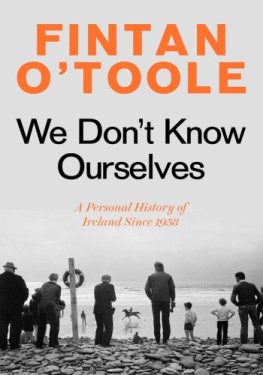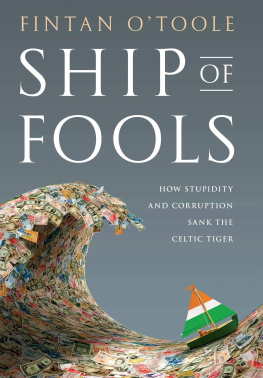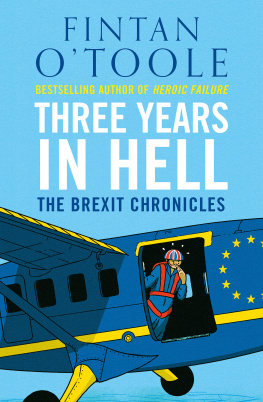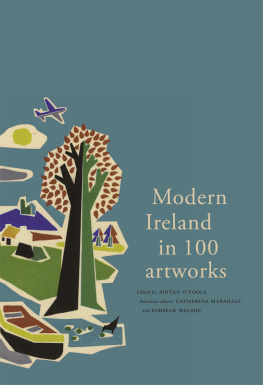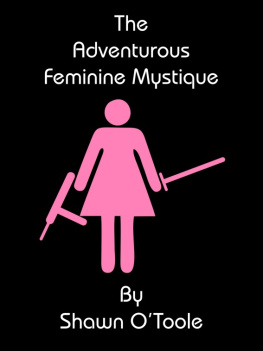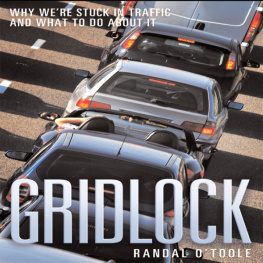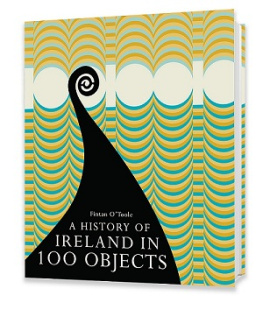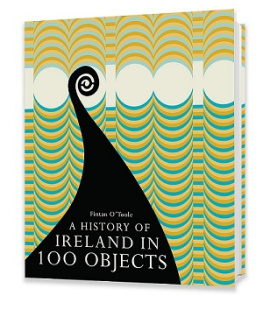Fintan OToole - We Don’t Know Ourselves
Here you can read online Fintan OToole - We Don’t Know Ourselves full text of the book (entire story) in english for free. Download pdf and epub, get meaning, cover and reviews about this ebook. year: 2021, genre: Politics. Description of the work, (preface) as well as reviews are available. Best literature library LitArk.com created for fans of good reading and offers a wide selection of genres:
Romance novel
Science fiction
Adventure
Detective
Science
History
Home and family
Prose
Art
Politics
Computer
Non-fiction
Religion
Business
Children
Humor
Choose a favorite category and find really read worthwhile books. Enjoy immersion in the world of imagination, feel the emotions of the characters or learn something new for yourself, make an fascinating discovery.
- Book:We Don’t Know Ourselves
- Author:
- Genre:
- Year:2021
- Rating:5 / 5
- Favourites:Add to favourites
- Your mark:
- 100
- 1
- 2
- 3
- 4
- 5
We Don’t Know Ourselves: summary, description and annotation
We offer to read an annotation, description, summary or preface (depends on what the author of the book "We Don’t Know Ourselves" wrote himself). If you haven't found the necessary information about the book — write in the comments, we will try to find it.
We Don’t Know Ourselves — read online for free the complete book (whole text) full work
Below is the text of the book, divided by pages. System saving the place of the last page read, allows you to conveniently read the book "We Don’t Know Ourselves" online for free, without having to search again every time where you left off. Put a bookmark, and you can go to the page where you finished reading at any time.
Font size:
Interval:
Bookmark:
We Dont Know
Ourselves
Meanwhile Back at the Ranch
White Savage
A Traitors Kiss
Ship of Fools
Enough is Enough
Judging Shaw
Heroic Failure
Three Years in Hell
FINTAN
OTOOLE
We Dont Know
Ourselves
A Personal History of
Ireland Since 1958
AN APOLLO BOOK
www.headofzeus.com
First published in the UK in 2021 by Head of Zeus Ltd
An Apollo book
Copyright Fintan OToole, 2021
The moral right of Fintan OToole to be identified as the author of this work has been asserted in accordance with the Copyright, Designs and Patents Act of 1988.
All rights reserved. No part of this publication may be reproduced, stored in a retrieval system, or transmitted in any form or by any means, electronic, mechanical, photocopying, recording, or otherwise, without the prior permission of both the copyright owner and the above publisher of this book.
The credits on constitute an extension of this copyright page.
Every effort has been made to trace copyright holders and to obtain their permission for the use of copyright material. The publisher apologises for any errors or ommisions and would be grateful if notified of any corrections that should be incorporated in future reprints or editions of this book.
A catalogue record for this book is available from the British Library.
ISBN (HB): 9781784978297
ISBN (E): 9781784978280
Head of Zeus Ltd
First Floor East
58 Hardwick Street
London EC1R 4RG
WWW.HEADOFZEUS.COM
Contents
To Kieran, Valerie and Patrickand in memory of Mary and Colm
The Loneliest Boy in the World
At Christmas 1948, ten years before my own birth, two wise men came bearing gifts for a child born in a humble cabin. Yet this child was seen as a harbinger, not of the birth of a new world, but of the death of an old one. He was called Gearid Cathin, and he was the only child left on the Blasket Islands, off the coast of Co. Kerry. The Blaskets were famous as a remnant of an old Gaelic world, a vestige of an ancient way of life. The community had a remarkable late flourishing of literary self-expression in the autobiographical books of Toms Criomhthain, Peig Sayers, Muiris Sileabhin and other islanders. For Irish nationalists, it was a microcosm of the distinctive culture they had promised to revive hardy, simple, pious, but rich in memories and dense with stories and songs in the Irish language.
Now, though, it was a microcosm of something else: the disappearance of the Irish world. The life blood of the islands was draining away westward, as the people emigrated, in particular to Springfield, Massachusetts, where they found work in the blast furnaces and cloth mills. The names of places spoken of by those who went and returned were now American addresses: Van Horn Park and Chicopee, Indian Orchard and Watershops Pond.
The wise men who came with gifts for Gearid Cathin were a reporter, Liam Robinson, and a photographer from the Irish Press , the newspaper owned by the man who had dominated Irish politics for thirty years, Eamon de Valera, who was Taoiseach (prime minister) for most of the 1930s, 1940s and 1950s. Robinson framed his story as the swansong, not just of an offshore village, but of an epoch spanning millennia, making little Gearid the heir to a civilisation and island home that is dying. He will be remembered as a last link with the Hidden Ireland. Gearid was the Last of the Mohicans.
On that first pre-Christmas trip, the reporter laid at his feet toys, bootees and things on wheels and recorded the sounds, in his infants Irish, that expressed his wonderment.
Robinsons story was taken up by international newspapers, often under the headline The Loneliest Boy in the World. Readers moved by his plight sent gifts for Gearid. As he told Bob Quinn in 1993, I got parcels from Australia and from New Zealand and from America. In 1949 he got trains, cars, trucks, every sort of book clothes and shoes. There was no stop to them. In the middle of that year my name was on everyones lips as if I were a film star. Patrick Fitzgerald, a rancher in Minnesota who read the story in a local paper, wrote to his parents. He told them he had lost two children in their tender years and that he and his wife would like to adopt Gearid, who in time would inherit their property. When the parents declined the offer, Fitzgerald offered to take the whole family to Minnesota. The Irish Press reported in 1951 that On the wall of the cottage where he was born hangs a big framed picture of New York. Asked in 1951 what would become of him, Gearid replied, raghad go Merica I will go to America.
When the islands were finally abandoned by their dwindling population in November 1953, there were reasons to fear what their fate might portend for the wider project of Irish independence. Thirty years earlier, after a decade of turbulence and violence, the Irish Free State had emerged in twenty-six of the islands thirty-two counties, the other six north-eastern counties formed into the new entity of Northern Ireland, dominated by its Protestant majority and still part of the United Kingdom. In 1948, when Gearid became famous, the Free State officially declared itself a republic and cut its last formal times with Britain. It was unquestionably now a sovereign state, with its destiny in its own hands.
It was ruled by two virtually identical nationalist political parties that emerged from the civil war of 1923, Fine Gael and by far the most successful the Fianna Fil party of de Valera, last surviving commandant of the Easter Rising of 1916 that ignited the revolutionary movement. Both parties were fervently Catholic, deeply respectful of the right of the church hierarchy to make binding rulings on all questions of morality, especially those relating to reproduction and sexuality. Both claimed as a priority the revival of the Irish language as the vernacular of the people and both equally did nothing to stop the death of Irish-speaking communities like that on the Blaskets. Both saw the Irish economy as essentially agrarian and Irish society as properly rural. Both insisted that partition was a great sin and that the lost six counties must be restored to make Ireland whole again. Neither did very much thinking about how this might happen.
This apparent unanimity of purpose concealed, however, a much deeper contradiction. The state was supposed to be autonomous and sharply defined and the longer it was established the more so it ought to have become. In truth, it felt ever more powerless and increasingly blurry. Ireland remained neutral in the Second World War and emerged into the world of the post-war boom as a backwater and an irrelevance. Its economic backwardness meant that it could not contain itself its people, like those of the Blaskets, were leaving for the very thing a holy and romantic Ireland could not provide: ordinary urban, industrial modernity. Given a choice between being the Last of the Mohicans or living in Indian Orchard, Springfield, they were voting with their feet.
In 1959, the year after I was born, and the first year of a radical programme to try to save Ireland by modernizing its economy, the British astronomer Fred Hoyle published Ossians Ride . The novel is a strange mixture of science fiction and John Buchan-style adventure story. In it, it is now 1970. The narrator Thomas Sherwood, a young English mathematician, is summoned by British intelligence and sent on a mission to penetrate the headquarters of ICE, the Industrial Corporation of ire, a fictionalized version of the actual IDA, the Industrial Development Authority which was given the task of attracting foreign investment to Ireland. The nature of ICE is explained to Sherwood: ICE came into being some twelve years ago. A small group of very able scientists approached the government of ire with what seemed an entirely straightforward proposition. The proposal was to establish an industry for the extraction of a range of chemicals from the organic material in peat turf as the Irish call it Within a short time, ICE was producing an amazing range of valuable chemicals ostensibly from turf as raw material, although whether this was really so is open to doubt.
Next pageFont size:
Interval:
Bookmark:
Similar books «We Don’t Know Ourselves»
Look at similar books to We Don’t Know Ourselves. We have selected literature similar in name and meaning in the hope of providing readers with more options to find new, interesting, not yet read works.
Discussion, reviews of the book We Don’t Know Ourselves and just readers' own opinions. Leave your comments, write what you think about the work, its meaning or the main characters. Specify what exactly you liked and what you didn't like, and why you think so.

